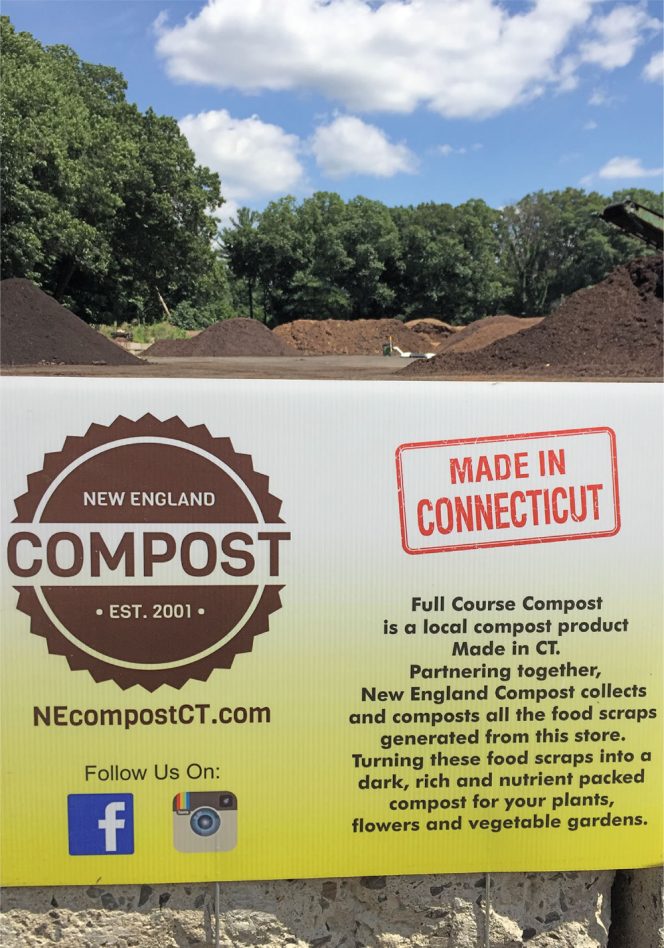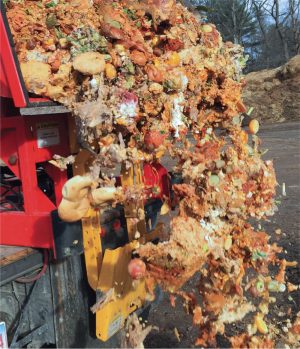New England Compost has been steadily growing its collection and composting service since featured in BioCycle last fall.
Dan Emerson
BioCycle August 20165

Information provided to Adam’s Hometown Market’s grocers selling New England Compost’s bagged compost that includes food scraps from those stores. Photo by Jeff Demers
In the summer of 2015, New England Compost began accepting organics under a pilot project from five area supermarkets — two Shop-Rite stores in Norwalk and Stamford (material is delivered to Demers’ facility), and three Adams Hometown Market stores in Watertown, Terryville and Thomaston (see “Evolving Into Food Scraps Composting,” November 2015). Adams recently added three more stores, and plans to add at least another three, Demers notes. “Some of the stores are much farther away from my facility so we are trying to locate a bigger truck in order to make the trip using one truck in one day.”
NEC’s uses a solar-powered aerated static pile composting system that was designed and manufactured by 02 Compost. One recent system improvement has been upgrading the solar panels. Demers is now operating six 315-watt neon monocrystaline panels manufactured by LG Solar Energy. (It previously was using a 240 volt, 60 hz system.) The upgrade has enabled the batteries that store the electricity to charge much more quickly. “With the original setup of three, 270-watt panels, and the seasonal change (to fewer hours of daylight) last fall and winter, it was not charging quickly enough, and taking a toll on the batteries,” he explains. “Having six panels with one blower has made a huge improvement.”
Servicing Schools
Success with the pilot collecting food waste from area supermarkets led Demers to this recent expansion. “One key to the success is that our clients have done a great job with separation to prevent contamination,” he says. “We felt this would be a great opportunity to expand, so we have done that. Going into this summer season, we were probably up to 15 to 18 tons/week of food waste, including 9 private schools.” The company kicked off its food scraps collection originally with schools before starting the supermarket pilot.
NEC may add three more school accounts by this fall, but Demers notes that the company has had “our ‘ups and downs’ with the schools. We’ve done a lot of educating on proper separation, and have had some good moments, and some moments when we could tell there was some neglect on the student separation side. The school kitchens have been doing a great job but, sometimes, if they’re not monitoring the students, the contamination gets a little heavier.”
The most common contaminants are items such as saltine wrappers, and butter and ketchup packets. Some of the schools are trying to transition away from this packaging. Demers also has made some changes in his food waste collection methods to make the process go more smoothly. For example, filled totes were swapped out for empty ones and unloaded at the composting facility. Now, NEC rents totes to customers and empties them on-site. “By tipping on-site we can address any contamination issues right away, so that’s a plus,” he explains.

Source separated organics from grocery stores and schools — about 15 tons/week — are being collected. Photo by Jeff Demers
At this point, Demers has not ventured into residential food scraps collection, opting to focus only on commercial and some institutional generators. “A residential service was started in one of the neighboring towns, but from what I gather it is going slowly,” he notes. “And, I’m not really set up to do (residential).”
However, NEC has been servicing a residential food scraps drop off program in the town of Ridgefield. Bins are located at the town’s recycling center, and NEC collects the organics once a week.
Closing The Loop
This spring, nine Adams Hometown Market stores serviced by NEC began buying the facility’s bagged compost for retail sale. They include stores in the cities of Watertown, Terryville, Thomaston, Milford, Derby, Shelton, Deep River, Portland and Flanders. “They each took 40, 20-quart bags,” explains Demers. “Most stores sold out and customer feedback was positive.”
In his first season of selling bagged compost, Demers’ order for plastic bags was delayed, “and we missed some (springtime) opportunities with garden centers,” he adds. “It was our first year of bagging, so it was very experimental. But we just heard from a local landscaper we sell mulch to who is interested in selling the bags of compost as well.”
Demers plans to keep expanding NEC at a moderate pace to ensure he has the capacity to handle the steadily growing demand for food waste collection in Connecticut. Overall, the NEC facility is permitted to receive 5,000 cubic yards of organics annually.
“Everything I have been able to produce up to this moment has been sold, or will be sold,” he says, noting that the biggest limiting factor is the quantity of food waste available for collecting. “We’re still trying to generate more leads and get those scraps. It’s a work in progress.”
Dan Emerson is a Contributing Editor to BioCycle.










